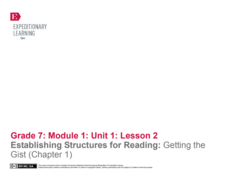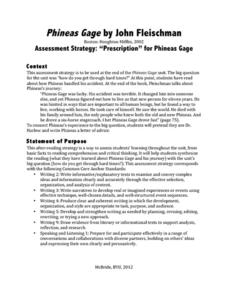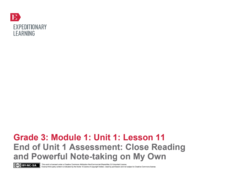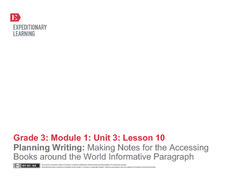Curated OER
Handling Fear
By sharing stories and doing role-play activities, youngsters learn how to deal with their fears. A class discussion is held where the teacher shares some things that used to scare him/her as a child. The kids come up with suggestions of...
Curated OER
Comprehension: Compare and Contrast Topics in Two Texts
A scripted lesson can be a big help for new teachers. This fully scripted three-day learning activity provides teachers with the means to demonstrate how to compare and contrast two topics in two texts. Learners will work as a class to...
Curated OER
Carta del tratado entre España y los Estados Unidos
Explore the history between Spain and the United States. Class members examine a copy of an original letter written in 1821 by Colonel Jose Coppinger in St. Augustine, Florida about the treaty that refers to the Florida territory that...
Museum of Disability
Stand Tall, Molly Lou Melon
Help to create the next generation of friends with a lesson plan about accepting people who are different. As kids read Stand Tall, Molly Lou Melon, they answer a series of discussion questions and activities about making friends with...
Museum of Disability
Looking Out for Sarah
Perry the dog is Sarah's best friend and her guide to the visual world. Young readers learn about guide dogs and communication with Looking Out for Sarah by Glenna Lang, through a series of discussion questions and activities.
Museum of Disability
The Right Dog for the Job
Here, dog lovers can enjoy an educational lesson about the ways puppies are trained to become service and guide dogs. Based on The Right Dog for the Job by Dorothy Hinshaw Patent, the lesson provides discussion questions for learners...
Maryland Department of Education
The Concept of Diversity in World Literature Lesson 1: Unit Introduction
To launch a unit study of the concept of diversity in World Literature, class members compare Chinua Achebe's essay, "An Image of Africa: Racism in Conrad's Heart of Darkness" and Richard Rodriguez's essay, "The Chinese in All of Us: A...
EngageNY
Establishing Structures for Reading: Getting the Gist (Chapter 1)
Class members review expectations for successful discussions before reading chapter one of A Long Walk to Water by Linda Sue Park. They engage in a think-pair-share to discuss the gist of the text and add their thoughts to their Readers'...
Curated OER
Edward Lear, Limericks, and Nonsense
Introduce your class to the delights of nonsense poetry and explore literary devices with the writing of Edward Lear. Learners identify rhyme and meter as well as figures of speech, alliteration, and onomatopoeia in "The Owl and the...
Curated OER
Tears of Joy Theatre Presents Anansi the Spider
Accompany the African folktale, Anansi the Spider, with a collection of five lessons, each equipped with supplemental activities. Lessons offer multidisciplinary reinforcement in English language arts, social studies, science, and arts...
EngageNY
Analyzing the Model Essay: Studying Argument (Chapter 27 Plus Synthesis of Scenes in Previous Chapters)
Scholars partner up to review a model essay and talk through the process leading up to writing their essays. During a second reading of the essay, learners locate and underline the claim given, reasons, and counterclaim. They then...
EngageNY
Studying Conflicting Information: Varying Perspectives on the Pearl Harbor Attack, Part 1
Scholars read President Roosevelt's Day of Infamy speech and analyze the speech's words using close reading guides. Readers determine Roosevelt's point of view after reading the speech and filling in the guides.
EngageNY
End of Unit 1 Assessment: Fishbowl Discussion, Part 2: Comparing Conflicting Accounts of the Pearl Harbor Attack
Partner up! Scholars continue their fishbowl activity with one partner sitting inside the circle and one sitting outside the circle. Participants add to sentence starters to analyze the perspective of the Pearl Harbor Attack seen in the...
EngageNY
Analyzing the Model Essay: Studying Argument
Scholars begin writing an argument essay based on Shakespeare's A Midsummer Night's Dream. They read and analyze a model essay, considering the author's thinking before writing it.
EngageNY
Studying Conflicting Information: Varying Perspectives on the Pearl Harbor Attack, Part 2
Scholars take another look at Japan's Fourteen-Part Message. They then take turns adding ideas to sentence starters to create ideas about the different perspectives of government. To finish, groups mix and mingle to share their sentences...
EngageNY
Studying Conflicting Interpretations: Perspectives on Plessy v. Ferguson: Part 2
The Plessy v. Ferguson case was influential in establishing segregation in the United States. Scholars continue reading the court's decision in the case, seeking to understand the key reasons the court came to its decision. Pupils also...
EngageNY
Studying Author’s Craft: Carlotta’s Journey
The longest journey begins with a single step. Scholars analyze the details of Carlotta Walls LaNier's journey through the desegregation of schools in the United States. They continue reading the author's memoir, A Mighty Long Way and...
EngageNY
Analyzing Word Choice: Understanding Working Conditions in the Mills
Ravenous or hungry, happy or ecstatic—why does word choice matter? Scholars continue to analyze working conditions in the mill and how the conditions affect the protagonist of Katherine Paterson's novel, Lyddie. They engage in a close...
Curated OER
Phineas Gage: Assessment Strategy
Close up your study of Phineas Gage: A Gruesome but True Story About Brain Science with a letter-writing assignment. Pupils prepare by journaling and sharing with a partner. They then compose letters that focus on a big idea from the...
EngageNY
End of Unit 1 Assessment: Close Reading and Powerful Note-Taking on My Own
As the final lesson plan in a larger beginning-of-the-year unit to establish routines and teach close reading skills, this plan is designed as an assessment piece. Using the story, The Librarian of Basra, learners independently complete...
EngageNY
Planning Writing: Making Notes for the Accessing Books Around the World Informative Paragraph
Encourage your young writers to thoughtfully plan and organize their work. First, model how this is done and vocalize your thought process as you work. Next, create a class list of strategies that they can use during independent writing...
EngageNY
Modeling Entry Task, Reading Notes, and Reading Strategies for Lyddie
Readers understand a text better when they discuss it with someone else. Scholars continue reading the novel Lyddie by Katherine Paterson, engaging in text-related discussions with five classmates. Next, they add to their chapter three...
PBS
Their Eyes Were Watching God: Socratic Seminar
A Socratic seminar wraps-up a study of Zora Neale Hurston' Their Eyes were Watching God. Using the text and their notes, scholars focus on how characters in the novel accept or reject the societal norms of the times.
EngageNY
Presenting a Research-Based Claim: Effective Speaking Techniques
Take note. Scholars receive their claim drafts back to revise and write their claims and three pieces of evidence on notecards. They save the notecards to use when the verbally present their claims to the class. At the end, individuals...
Other popular searches
- English Language Skills
- Pragmatic Language Skills
- Expressive Language Skills
- Oral Language Skills
- Language Skills Lesson Plans
- English Language Arts Skills
- Early Literacy Oral Language
- Functional Language Skills
- Social Language Skills
- Studying Latin Language
- Basic Language Skills
- Figurative Language Skills

























